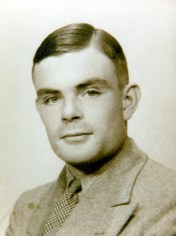A hundred years have elapsed since the birth of the mathematician, codebreaker, and father of computer science, Alan Turing.
Due to space restrictions, a drastically shorter version of what follows appeared on page 16 of the November/December ACS Information Age magazine.
In response to an online petition in the lead-up to the centenary of Alan Turing’s birth, the British PM, Gordon Brown, said in 2009: “Turing was dealt with under the laws of the time, and we can’t put the clock back, his treatment was utterly unfair. On behalf of the British government and all those who live freely thanks to Alan’s work, I am very proud to say: we’re sorry. You deserved so much better.” [1] This statement concerned the appalling treatment Turing received for “gross indecency”, the charge made against him as a homosexual person living in the UK in the mid-20th century. His choices were chemical castration and jail. He chose the former, which affected his concentration and self-esteem, undoubtedly contributing to his apparent suicide via a cyanide-dipped apple in 1954.
It would be an understatement to say that Turing achieved much in his 42 years. He contributed to a fundamental problem in mathematics, in the process becoming the father of computer science prior to the existence of general purpose computing machines. He played a pivotal role in the Second World War as a Bletchley Park cryptanalyst for which he was awarded an OBE, wrote a seminal paper on the modeling of biological growth, worked on pioneering computer projects, and founded the field of Artificial Intelligence (AI).
For anyone in the computing field, Turing’s most important contribution was his 1936 paper “On Computable Numbers” and in particular, the abstraction he described and used to present the halting problem, now known as the Turing Machine, the conceptual essence of a general purpose computer.
Turing was keenly interested in algorithms and applications, independently arriving at the utility of the subroutine library. He wrote and optimised early library routines e.g. for long division, random number generation and investigated numerical analysis problems such as rounding errors. He wrote code relating to number theory for the Manchester computer. He also wrote a chess program that was only simulated on paper due to a lack of computer time being made available.
For those with more pragmatic inclinations, from 1945 to 1951, after his time at Bletchley Park, contemporaneous with ACS founder John Bennett’s work on CSIRAC, Turing was involved with pioneering computer projects including the design of the Automatic Computing Engine (ACE, later built as the Pilot ACE), The Manchester Baby or Small Scale Experimental Machine (SSEM), and the Ferranti Mark I, for which he wrote the Programmer’s Manual in 1951. The Pilot ACE is on display in the London Science Museum. His design frequently changed, was optimal in terms of hardware, but complex to program. Turing said: “In working on the ACE I am more interested in the possibility of producing models of the brain than in the practical applications to computing”. [2]
Early insights into the nature of AI set down in a paper entitled “Computing Machinery and Intelligence”, published in the philosophy journal Mind in 1950, led to his notion of an “Imitation Game”, the now famous “Turing Test”, a means by which to determine whether a questioner is communicating with an entity with human-level AI.
The ACM presents the Turing Award annually to someone who has contributed something that is judged to be of major and lasting importance to the computing science field. One of its recipients, Alan Perlis, in 1966 said: “On what does and will the fame of Turing rest? That he proved a theorem showing that for a general computing device—later dubbed a “Turing Machine”—there existed functions which it could not compute? I doubt it. More likely it rests on the model he invented and employed: his formal mechanism. This model has captured the imagination and mobilized the thoughts of a generation of scientists”.
Arguably, Turing is to Computing as Einstein is to Physics. In 2005, there were celebrations worldwide of Einstein’s “year of miracles”. This year there have been similar celebrations of Turing’s birth 100 years ago. [3] Einstein and E=MC2 are well known, but can the same be said of Turing and his Machine? Is he a household name along with Einstein? Many take for granted the existence of the computer, smart phones, and a myriad other computationally-enabled devices found in virtually every facet of our modern lives. We, as computing professionals, should strive to make better known the work of Turing and his contemporaries, and more generally, the broader history of our field.
I looked into the possibility of an Adelaide cinema screening of the film, CODEBREAKER, about Turing’s life (via TodPix) but received a response to say that there are no plans for a theatrical release in Australia; it was screened on SBS One in June 2012 on a 3 year contract, so perhaps it will be aired again.
Update (November 2013): CODEBREAKER is now available for sale on DVD!
References
- http://www.abc.net.au/radionational/programs/scienceshow/alan-turing-e28093-thinker-ahead-of-his-time/4034006
- Lavington, S. (ed.), 2012, “Alan Turing and his Contemporaries”, BCS
- http://amturing.acm.org/acm_tcc_webcasts.cfm
- http://www.turingfilm.com
- http://www.turing.org.uk/turing/
- “The ACM Turing Award Lectures: The First Twenty Years”, 1987, ACM Press

November 13, 2013 at 6:23 am |
[…] November 2012 I posted about the centenary of Alan Turing’s birth and mentioned the film CODEBREAKER about his life and tragic death. It’s finally available […]
December 9, 2013 at 3:46 am |
This is a good read, and very appreciated comment that fame != importance. I’m now going to follow your references down the rabbit hole…
July 19, 2019 at 11:00 pm |
[…] I wrote this about Alan Turing In 2012: […]